Monthly Updates on Recent Books in the History of Christianity
To raise awareness of recent books in the history of Christianity, the editorial staff of Church History: Studies in Christianity and Culture highlights each month a list of 10-15 books in diverse periods and geographical regions that we hope will be of interest to our members. We include here below the 33rd monthly list, chosen by our staff, with excerpts from the publishers’ blurbs.
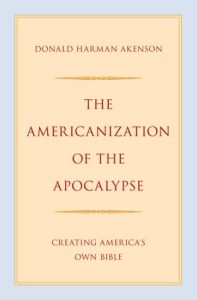
Donald Harman Akenson, The Americanization of the Apocalypse: Creating America's Own Bible. 2023
In the early twentieth century, a new, American scripture appeared on the scene. It was the product of a school of theological thinking known as Dispensationalism, which offered a striking new way of reading the Bible, one that focused attention squarely on the end-times. That scripture, The Scofield Reference Bible, would become the ur-text of American apocalyptic evangelicalism, and later, a core text of America's white Christian nationalism.
In The Americanization of the Apocalypse: Creating America's Own Bible Donald Harman Akenson examines the creation and spread of Dispensationalism. The story is a transnational one: created in southern Ireland by evangelical Anglicans, who were terrified by the rise of Catholicism, then transferred to England, where it was expanded upon and next carried to British North America by "Brethren" missionaries and then subsequently embraced by American evangelicals.
Akenson combines a respect for individual human agency with an equal recognition of the complex and persuasive ideational system that apocalyptic Dispensationalism presented. For believers, the system explained the world and its future. For the wider culture, the product of this rich evolution was a series of concepts that became part of the everyday vocabulary of American life: end-times, apocalypse, Second Coming, Rapture, and millennium. The Americanization of the Apocalypse is the first book to document, using direct archival evidence, the invention of the epochal Scofield Reference Bible, and thus the provenance of modern American evangelicalism.
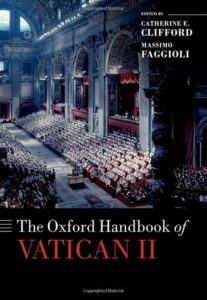
Catherine E. Clifford and Massimo Faggioli, eds. The Oxford Handbook of Vatican II. 2023
The Oxford Handbook of Vatican II is a rich source of information and reflections on many aspects of the Second Vatican Council (1962-1965), one of the most significant religious events of the twentieth century. The chapters introduce readers to the historical context and outstanding features of the conciliar event, and its principal teachings on Scripture and Tradition, the church, liturgy, religious liberty, ecumenism, interreligious dialogue, church-world relations, and mission. Consideration is given to some neglected aspects of the council, including: the forgotten papal speeches that lay out its fundamental orientation and ought to guide its interpretation; the presence and contributions of women; and the non-reception of the council among Catholic traditionalists. Ecumenical scholars reflect on the significance of Vatican II for the life of other Christian churches and the search for Christian unity; others examine Catholic dialogue with other religious traditions. Surveying the diverse receptions of the council in the perspective of a world church, chapters focusing on Asia, Africa, Latin America, North America, Oceania, and Europe reflect on the interpretation and influence of the council and its teaching on the life of the church in diverse cultural contexts. This Handbook will serve as a valuable guide to one of the most important events and bodies of Catholic teaching since the Protestant Reformation and the Council of Trent in the sixteenth century, to the interpretation of the council's teaching, and to its continuing role in guiding the life of the church in the twenty-first century.

Maria Falina, Religion and Politics in Interwar Yugoslavia: Serbian Nationalism and East Orthodox Christianity. 2023
Religion and Politics in Interwar Yugoslavia explores the interaction between religion, nationalism, and political modernity in the first half of the 20th century, taking the case of the Serbian Orthodox Church as an example. This book historicizes the widely held assumption that the bond between religion and nationalism in the Balkans is a natural one or that this bond has been historically inevitable. It tells a complex story of how East Orthodox Christianity came to be at the core of one version of Serbian nationalism by bringing together the themes of religion, nationalism, politics, state-building, secularization, and modernity.
Maria Falina reconstructs how the ideological fusion between Serbian nationalism and East Orthodox Christianity was forged. The analysis emphasizes ideas and ideologies through a close reading of public discourses and historical narratives while paying attention to individual actors and their personal histories. The book argues that the particular political vision of the Serbian Orthodox Church emerged in reaction to and in interaction with the challenges posed by political modernity that were not unique to Yugoslavia. These included establishing the modern multinational and multi-religious state, the fear of secularization, and the rise of communism and fascism. Religion and Politics in Interwar Yugoslavia makes an important contribution to understanding the history of interwar Yugoslavia, 20th-century Europe, and the ties between religion and nationalism.
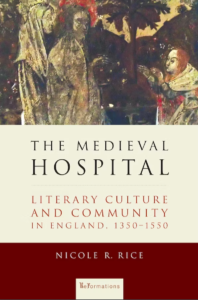
Nicole R. Rice, The Medieval Hospital: Literary Culture and Community in England, 1350-1550. 2023
The hospitals of late medieval England defy easy categorization. They were institutions of charity, medical care, and liturgical commemoration. At the same time, hospitals were cultural spaces sponsoring the performance of drama, the composition of medical texts, and the reading of devotional prose and vernacular poetry. Such practices both reflected and connected the disparate groups—regular religious, ill and poor people, well-off retirees—that congregated in hospitals. Nicole Rice’s The Medieval Hospital offers the first book-length study of the place of hospitals in English literary history and cultural practice.
Rice highlights three English hospitals as porous sites whose practices translated into textual engagements with some of urban society’s most pressing concerns: charity, health, devotion, and commerce. Within these institutions, medical compendia treated the alarming bodies of women and religious anthologies translated Augustinian devotional practices for lay readers. Looking outward, religious drama and socially charged poetry publicized and interrogated hospitals’ caring functions within urban charitable economies. Hospitals provided the auspices, audiences, and authors of such disparate literary works, propelling these texts into urban social life. Between ca. 1350 and ca. 1550, English hospitals saw massive changes in their fortunes, from the devastation of the Black Death, to various fifteenth-century reform initiatives, to the creeping dissolutions of religious houses under Henry VIII and Edward VI. This volume investigates how hospitals defined and defended themselves with texts and in some cases reinvented themselves, using literary means to negotiate changed religious landscapes.
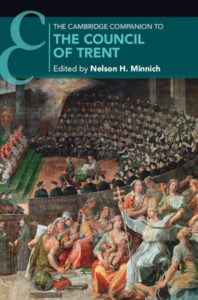
Nelson H. Minnich, The Cambridge Companion to the Council of Trent. 2023
The Council of Trent was a major event in the history of Christianity. It shaped Roman Catholicism's doctrine and practice for the next four hundred years and continues to do so today. The literature on the Council is vast and in numerous languages. This Companion, written by an international group of leading researchers, brings together the latest scholarship on the principal issues treated at the Council: the relationship between Scripture and Tradition, original sin, justification, the sacraments (Baptism, Penance, Confirmation, Eucharist, Holy Orders, Marriage, and the Annointing of the Sick), sacred images, sacred music, and its reform of religious orders, the training of the clergy, the provision of pastoral care in the parish setting, and the implementation of its decrees. The volume demonstrates that the Council unwittingly furthered the papal centralization of authority by allowing the interpretation of its decrees to be the exclusive prerogative of the Holy See, and entrusting it with their implementation.
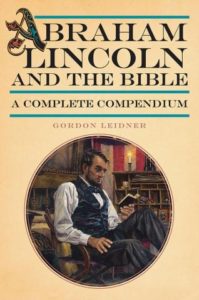
Gordon Leidner, Abraham Lincoln and the Bible: A Complete Compendium. 2023
Southern Illinois University Press
How did Abraham Lincoln’s lifelong study of scripture influence him as a man and, ultimately, as president? Historian Gordon Leidner believes the impact was profound—more than previously recognized—and has investigated all the known writings of Abraham Lincoln to identify, catalog, and study every instance in which Lincoln quoted from or alluded to the Bible. Rather than dwelling on the never-ending debate about Lincoln’s religious beliefs, Leidner shows how scripture affected Lincoln personally, professionally, and politically.
Leidner offers first a short biography that focuses on Lincoln’s use of the Bible, how it shaped him as a person, how its influence changed over time, and how biblical quotations peppered his letters, speeches, and conversations. The book concludes with an unparalleled appendix that tabulates nearly 200 instances of Lincoln’s quoting from or alluding to scripture, giving locators for the Bible and Roy P. Basler’s nine volume Collected Works of Abraham Lincoln and quotations from both sources. The appendix also includes when and where Lincoln used each quote, providing valuable context, whether the use was in personal letters such as one to Queen Victoria after the death of Prince Albert, political speeches such as the Gettysburg Address, or state addresses such as the Second Inaugural Address.
By showcasing Lincoln’s specific biblical references and influences, Leidner reframes the question of Lincoln’s religious beliefs so that readers may evaluate for themselves what solace and guidance the Bible afforded the sixteenth president.
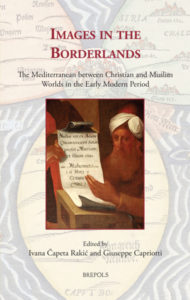
Ivana Čapeta Rakić and Giuseppe Capriotti, eds. Images in the Borderlands: The Mediterranean between Christian and Muslim Worlds in the Early Modern Period. 2022
This volume offers a unique exploration into the cultural history of the Mediterranean in the Early Modern Period by examining the region through the prism of Christian-Muslim encounters and conflicts and the way in which such relationships were represented in art works from the time. Taking images from the period as its starting point, this interdisciplinary work draws together contributors from fields as varied as cultural history, art history, archaeology, and the political sciences in order to reconstruct the history of a region that was often construed in the Early Modern period as a ‘borderland’ between religions. From discussions of borders as both physical construction and mental construct in the Mediterranean to case studies exploring the Battle of Lepanto, and from analyses of art work produced from the fifteenth to eighteenth centuries to a consideration of the influence of the Ottoman Empire in the Mediterranean Basin, the chapters gathered together in this insightful volume provide a new approach to our understanding of Early Modern Mediterranean history
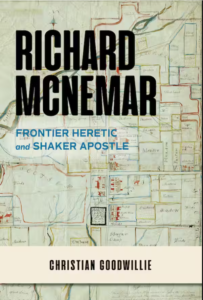
Christian Goodwillie, Richard McNemar: Frontier Heretic and Shaker Apostle. 2023
Richard McNemar (1770–1839) led a remarkable life, replete with twists and turns that influenced American religions in many ways during the early nineteenth century. Beginning as a Presbyterian minister in the Midwest, he took his preaching and the practice of his congregation in a radically different, evangelical "free will" direction during the Kentucky Revival. A cornerstone of his New Light church in Ohio was spontaneous physical movement and exhortations. After Shaker missionaries arrived, McNemar converted and soon played a prominent role in expanding and raising public awareness of their religion by founding Shaker communities in the Midwest, becoming the first Shaker published author and the most prolific composer of Shaker hymns.
Split between two opposing religious traditions—an evangelical movement attracting tens of thousands and Shakerism, which drew only hundreds to its villages—Richard McNemar's life poses a challenge for any biographer. Christian Goodwillie's mastery of the archival records surrounding McNemar and the Shakers allows him to tell McNemar's story in a way that fully captures the complexity of the man and the scope of his enduring legacy in American religious history.
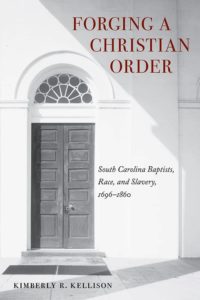
Kimberly R. Kellison, Forging a Christian Order: South Carolina Baptists, Race, and Slavery, 1696-1860. 2023
A significant contribution to the historiography of religion in the U.S. south, Forging a Christian Order challenges and complicates the standard view that eighteenth-century evangelicals exerted both religious and social challenges to the traditional mainstream order, not maturing into middle-class denominations until the nineteenth century. Instead, Kimberly R. Kellison argues, eighteenth-century White Baptists in South Carolina used the Bible to fashion a Christian model of slavery that recognized the humanity of enslaved people while accentuating contrived racial differences. Over time this model evolved from a Christian practice of slavery to one that expounded on slavery as morally right.
Elites who began the Baptist church in late-1600s Charleston closely valued hierarchy. It is not surprising, then, that from its formation the church advanced a Christian model of slavery. The American Revolution spurred the associational growth of the denomination, reinforcing the rigid order of the authoritative master and subservient enslaved person, given that the theme of liberty for all threatened slaveholders’ way of life. In lowcountry South Carolina in the 1790s, where a White minority population lived in constant anxiety over control of the bodies of enslaved men and women, news of revolt in St. Domingue (Haiti) led to heightened fears of Black violence. Fearful of being associated with antislavery evangelicals and, in turn, of being labeled as an enemy of the planter and urban elite, White ministers orchestrated a major transformation in the Baptist construction of paternalism.
Forging a Christian Order provides a comprehensive examination of the Baptist movement in South Carolina from its founding to the eve of the Civil War and reveals that the growth of the Baptist church in South Carolina paralleled the growth and institutionalization of the American system of slavery—accommodating rather than challenging the prevailing social order of the economically stratified Lowcountry.
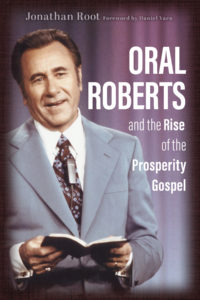
Jonathan Root, Oral Roberts and the Rise of the Prosperity Gospel. 2023
In 1946, God gave Oral Roberts a new Buick.
And this just one of many miracles the young, broke preacher learned to expect, as Oral Roberts would go on to build an evangelistic ministry worth millions of dollars, a medical complex, and a university. How do we interpret the life of a man who seemed to combine rampant consumerist excess with a sincere devotion to the gospel?
Seeking to answer this question, Jonathan Root weaves together accounts of Oral Roberts’s life in a balanced and engaging narrative. This fresh biography covers Roberts’s early life during the Great Depression in Oklahoma, his family’s financial struggles during his early career as a Pentecostal preacher, his healing ministry’s explosive growth in popularity via the new media of radio and television, and his empire’s eventual collapse. Root pays special attention to how Roberts introduced the “prosperity gospel” to American Protestants with his affirmation that God intends his followers to be both spiritually and physically fulfilled.
Root’s engaging narration looks to primary sources on Roberts’s life as well as the mythologized stories he told years later. The man who emerges is both deeply flawed and entirely earnest in his devotion to Christ. Oral Roberts and the Rise of the Prosperity Gospel will be an absorbing read for all those interested in American religious history and one of its most colorful figures.
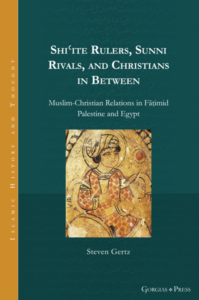
Steven Gertz, Shiʿite Rulers, Sunni Rivals, and Christians in Between: Muslim-Christian Relations in Fāṭimid Palestine and Egypt. 2023
The study of sectarianism in Islam and the study of Muslim-Christian relations are both sub-specialities attracting growing numbers of scholars in Islamic studies. Rarely, though, are these two fields put into direct conversation with each other. In this work, Steven Gertz brings the two together to ask how the Sunni-Shi'a divide in Islam impacts Muslim relationships with Christians. Do tensions within Islam do more to help Muslim relationships with Christians, or harm them? Gertz goes about answering this through a historical study of the Fatimid caliphate in Palestine and Egypt during the fourth/tenth and fifth/eleventh centuries. He specifically works to understand how Fatimid religious principles (ascertained through the study of law) and politics (ascertained through the study of history) impacted Christians in light of Fatimid-Abbasid rivalry. In the process of doing so, he makes a valuable contribution to the study of Islamic religious identity formation as it concerns sectarianism within Islam and inter-religious relations with non-Muslims.
Finally, for staying up-to-date on the latest titles in all fields, we recommend regularly perusing New Books Network and its "New Books in Christian Studies” page. These pages are updated regularly.
